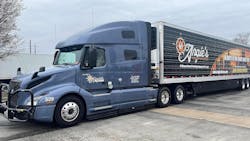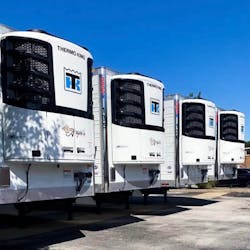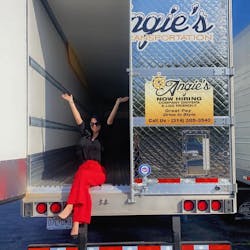Big-league businesswoman: Twardawa managing Angie's to new heights
Angie Twardawa was made to manage a trucking company.
Her father, Andrew Twardawa, operated military vehicles in Poland before coming to the United States, where he drove for Swift Transportation in the 1990s and started his own business, TWA Express, in the early 2000s. So she grew up in the industry, assisting with every office task, while also helping her parents navigate their adoptive home. “Every child of an immigrant parent knows what that’s like,” Angie said.
“You have to assist with adult tasks—so you learn responsibility from an early age.”
She also learned the value of determination, self-reliance, and resiliency—attributes that have served her well since founding her own company, Angie’s Transportation, in 2012 in St. Louis. This helped her overcome numerous obstacles over the last decade, including a devastating fire that slowed the refrigerated carrier’s expansion, pandemic-induced disruptions, and, most recently, a soft market for produce freight.
“You can’t just give up,” Angie advised. “You have to keep going when you have so many people depending on you.”
Her fortitude and foresight are fueling the company’s growth despite these challenges. The woman-owned business expects to add 30 trucks and 40 trailers this year, and a similar number of vehicles in 2024—when it also moves into its brand-new St. Louis headquarters with upgraded driver amenities and first maintenance facility. “If you’re not growing and you’re staying stagnant, that’s the death of a company,” she said.
“And freight’s cyclical, so there are always going to be good and bad years.”
Passion for trucking
Rafael Twardawa isn’t surprised by the company's success. When his younger sister sets her mind on doing something, she does it, he said. She has been this way since the two were little. So when Angie decided to leave college at 19 to start a trucking business, he jumped on board, helping found the company. “She lives, breathes, and dreams trucking,” Rafael attested. “That’s all she talks about.” She’s also resolved to prove trucking isn’t a man’s game, which is why she’s sole proprietor. Rafael serves as chief operations officer and Angie is CEO.
The two siblings, who boast complementary skillsets, also vowed to do things differently than their “rough-around-the-edges” dad—who always enjoyed driving a truck more than a desk—by combining his “old-school” values with innovative “new-age” principles to run an efficient, driver-friendly business. They targeted refrigerated transport as a niche segment that also opens them up for more freight opportunities.
The Angie’s fleet now includes 70 trucks and 100 trailers (80 reefers and 20 dry vans), and 80 total employees—but Angie is convinced they’d already be much larger if not for the “curveball” tossed their way in 2017.
Renewed operation
Smoke began pouring into their offices early that November morning at the 200,000-sq.-ft. Park Warehouse Services building, where Angie’s Transportation was the largest tenant. Overwhelmed, the Twardawas ran for the exit and called 911. “The next thing we knew the whole building went in flames, and then something blew up in the basement,” Angie Twardawa, who is now 30, recalled. “It was one of the worst fires in St. Louis history. It was a five-alarm fire, and part of the building exploded, and a wall collapsed on a fire truck and crushed it.”
Angie’s Transportation wasn’t storing freight at the time, but it lost several trailers parked near the building, all its office equipment, and, worst of all, every file on the in-house server. But after watching firefighters battle the blaze most of the day, they escaped to purchase new computers, set them up at their parents’ house, and began rebuilding the business that night. “It was challenging, but we didn’t allow it to stop us,” Rafael said.
Their work included calls to the U.S. Department of Transportation and their CPA, recreating driver qualification and maintenance files—now all saved on cloud-based servers for improved cyber and physical security—reestablishing their McLeod transportation management software, documenting the missing data, and looking for a new office, which they didn’t locate until the following summer. And with no warehouse space in the new building, they couldn’t keep their less-than-truckload business humming.
“It was a lot,” Angie said. But she clung to the belief that everything happens for a reason, and now the LTL operators are eager to establish the company's “forever home.” The siblings expect to break ground on a 22,000-sq.-ft. building this summer and move in early next year. The facility will feature a first floor dedicated to driver comforts, including a gym, and a two-bay garage, so Angie’s can perform its own preventive maintenance—Rafael’s true passion.
“It’s the right time for us to finally have something of our own,” Rafael said.
Something for drivers
The Twardawas often went on runs with their dad, so they’re familiar with the challenges drivers encounter on the road, and they always missed him when he was gone. So caring for drivers—who they see as customers—is priority No. 1, and that involves fair, per-mile pay; regular home time; consistent communication; and elite equipment. “We have so much to offer, and to us, a driver isn’t just a number,” Rafael, 40, said.
“We found drivers love the comfort of the Volvos, their performance, and how quiet they are,” Rafael said. “And we’re getting great miles per gallon [up to 8.0 mpg] with these units.”
Utility reefer trailers come from Craftsmen Utility Trailer in St. Charles, Missouri, and feature Hendrickson Tiremaax inflation systems and Thermo King Precedent C-600 transport refrigeration units with Triple Combo displays that make monitoring reefer status, temperature, and fuel level easy for drivers. However, Rafael said Angie’s Transportation plans to use Thermo King’s S-600 uni ts for CARB Evergreen compliance going forward.
And with plans to add 140 new vehicles over the next two years, Angie’s is undeterred by recent operating conditions.
“We’re confident we can overcome anything the market throws at us,” Rafael affirmed.
‘Lean and mean’
Unfortunately, temperature-controlled freight markets aren’t tossing up many softballs this year. National average spot reefer rates fell to two-and-a-half-year lows in the first quarter of 2023, according to a recent report by DAT Freight and Analytics, and the newly released TD Cowen/AFS Logistics predictive pricing index projected truckload rates further declining in the second quarter—data that rings too true for Angie’s over-the-road business, which includes frequent runs to Florida and Arizona for fruit—“luxury items” in lean times.
“Rates are down—and so is the market for refrigerated freight,” she acknowledged, citing several factors for softer conditions, including rising interest rates, inconsistent weather in key growing states, and retailers unwilling to cut margins. “This isn’t typical, so we’re having to adapt, but I’m hopeful things get easier here soon,” Angie said.
Rafael also pointed to lingering pandemic impacts, including limited supplies of key products. To compensate, Angie’s is ramping up dry-van operations, seeking out backhauls, calling on new customers, and using technology to streamline processes. “It’s tough, but now’s the time to save, really know your business, watch your costs, and be smart,” Rafael advised. Or, as Angie puts it—it’s time to “run lean and mean.”
Spinning wheels
The company is evaluating new software for temperature monitoring and predictive maintenance, Rafael said. Angie’s also is looking into adding side-facing cameras to better protect drivers and equipment. “The No. 1 priority is keeping our drivers happy,” he said. “And when the wheels are spinning, drivers are happy—and we’re successful.”
“We don’t like to stand still,” Rafael said. “We want to grow every week, every month, even if it’s just trying new ideas, new measures, or finding the right equipment. We try to grow as much as we can every single year in some way.”
And with Angie leading the way, Angie’s Transportation is in a league of its own.
“We’re living in crazy, scary times right now—but it’s exciting,” she said.
About the Author

Jason McDaniel
Jason McDaniel, based in the Houston TX area, has nearly 20 years of experience as a journalist. He spent 15 writing and editing for daily newspapers, including the Houston Chronicle, and began covering the commercial vehicle industry in 2018. He was named editor of Bulk Transporter and Refrigerated Transporter magazines in July 2020.




